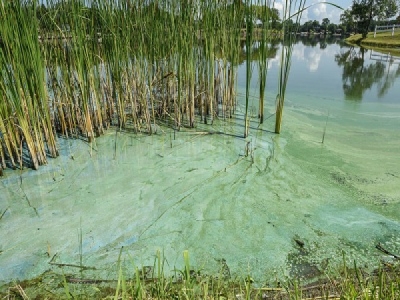
Posted on August 14, 2018
The Lake Mitchell Advisory Committee made its pitch Monday to the Mitchell City Council, stating that its recommendation of spending nearly $2 million in engineering and pursuing grants would be the best course of action toward a nearly $20 million improvement plan.
No action was taken Monday during the council’s regular meeting at the Mitchell City Hall, but members of the committee spoke about how they felt the plan for $19,810,693 in work was the best long-term plan for the city’s prized lake.
The three-part project of working on the lake included in-lake treatment (primarily dredging and a dam drawdown), near-lake treatments (retention ponds, wetland work, and identifying hotspots) and watershed improvements, Committee Chairman Joe Kippes said.
“We’ve been asked to do this and this is kind of what we’ve come up with,” Kippes said. “There’s no silver bullet that is going to fix this for us. If we’re going to fix this, we’re going to have to dig in and do it the hard way.”
The presentation noted that about 47 percent of the phosphorus in the lake has been attributed to the soft sediment in the lake, accumulating over the past 90 years. The other 53 percent was attributed to Firesteel Creek watershed run-off issues. Kippes said the in-lake and near-lake projects both have to be part of the long-term fix for the lake.
“We have to do both if we want to have a healthy lake, long-term,” he said.
The in-lake work is the most expensive, costing an estimated $11,245,280. The near-lake work was estimated at $8,489,220, while watershed improvements are estimated at $76,193. Kippes noted the cost was about $4 million more than the first technical memo prepared by engineers, mainly because more soft sediment was found than first forecasted, estimated at 2 million wet cubic yards.
Councilor John Doescher asked the certainty that costs won’t continue rising once contractors got into the lake to take out more sediment. Kippes said it’s possible that could happen, but the project now calls for a $1.7 million contingency and the additional research done has helped with mapping the lake’s status.
Kippes noted there’s not much available for grant funding for the load controls and mechanical engineering needed to take the sediment out of the lake. But grants could be used to pay for most of the retention pond, wetlands and hotspot identification efforts, plus watershed improvements, which would basically be exclusively funded through state and federal programs.
“The in-lake work, there’s not going to be a lot of help there,” he said.
Mitchell Parks and Recreation Director Nathan Powell reiterated that all three strategies would be important for the lake’s health.
“The first two get us to our goal and that’s what we’ve set out to do, and the watershed would help us improve upon our goal,” he said, adding that grant funding could bring the whole cost below $16 million.
With much of the focus on the overall recommendation, the lake committee’s formal request didn’t get a ton of discussion Monday. The committee recommended spending $21,420 on outside funding pursuits, $11,460 on identifying watershed hotspots and $554,000 for a drawdown installation. Of the $1,991,960 proposed, more than $1.4 million would go toward engineering for the drawdown design, mechanical engineering, online impoundment and the wetland complexes.
Tussle over pool punchlist
Mitchell Mayor Bob Everson was not afraid to spar with the representatives of Puetz Corporation Monday over a dispute regarding the retainage for the Mitchell Indoor Aquatic Center.
In the end, the city agreed to lower the request to $668,600, which was lower than the $720,000 that Puetz Corporation was asking for the retainage, which is the portion of the contract withheld until the work is substantially complete to assure that contractors will finish a project.
Puetz Corporation CEO Mark Puetz and Project Manager Keith Reiners said that while some jobs still had to be finished, the company had already met its substantial completion date. Everson was not willing to accept their explanation.
“The contract says you don’t get paid until it’s finished. … The bottom line is that you’re not finished,” Everson said.
The items not completed as of Aug. 1 were a slide stair rail and leak, new landscape timbers around playground equipment and closeout documents, which Puetz officials described as operations and maintenance manuals, along with a final stage of pool training.
Speaking to Puetz and Reiners, Everson said he “couldn’t believe you’re even in here” asking for the reduction.
The contract called for a 10 percent retainage until the project was fully completed, which meant there was $762,000 still uncollected by Puetz Corporation. In the end, $93,668.37 would be left for the project to be completed for city funds.
Source: The Daily Republic





